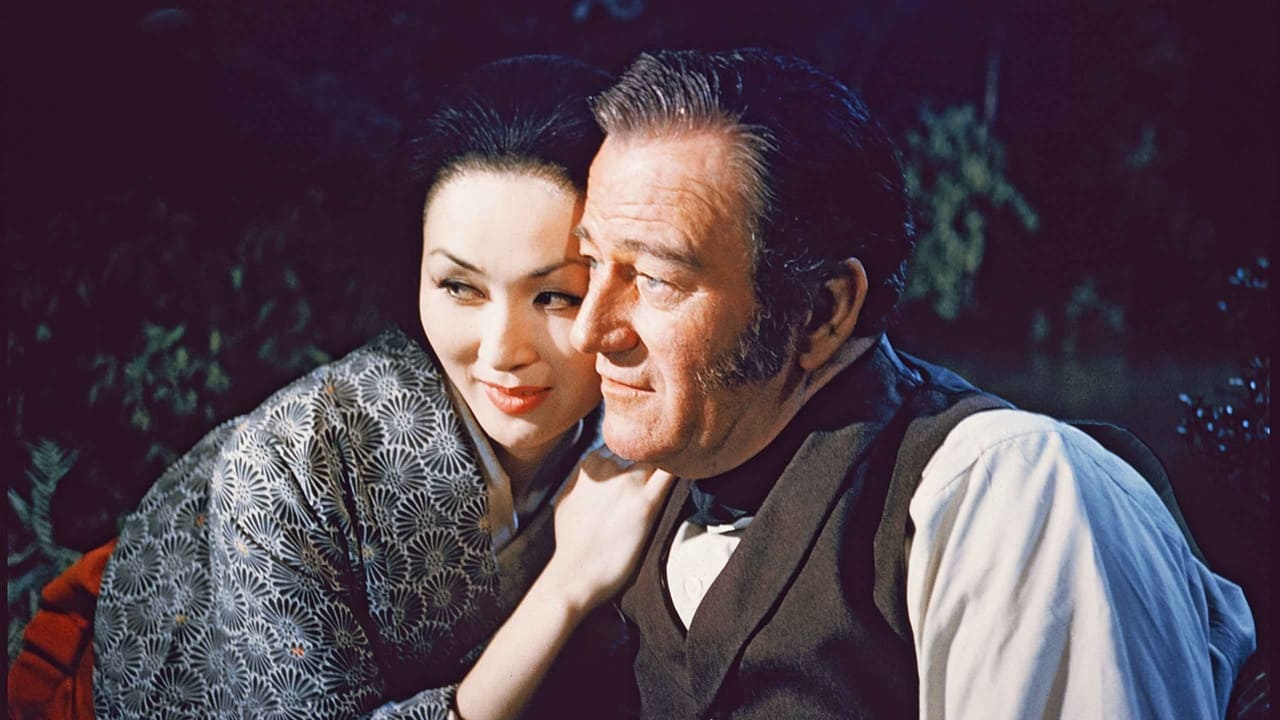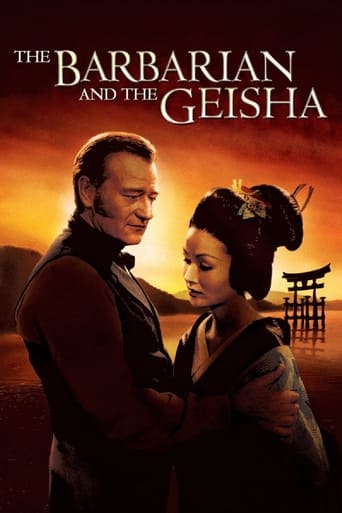



Too many fans seem to be blown away
The greatest movie ever made..!
Let's be realistic.
The movie is wonderful and true, an act of love in all its contradictions and complexity
View MoreThere's a lot of reason to like "The Barbarian And The Geisha," too bad so little of that shows up on screen. It's a classic case of how good intentions when married to fuzzy execution yield disappointing results.In 1856, following the opening of Japan to an American naval force, newly-appointed consul general Townsend Harris (John Wayne) shows up at the fishing community of Shimoda to ratify an agreement. He is met with resistance, much of it from a regional governor, Tamura (So Yamamura), who reminds Harris it takes two to make a treaty. Harris insists, and Tamura responds with some hospitality, including a music-making geisha named Okichi (Eiko Ando) who is sent to Harris to make him more comfortable."The governor wants to know about us, and we want to know about Japan," Harris tells his aide Henry (Sam Jaffe) in accepting the young lovely into his home.Shot on location in glorious CinemaScope, "The Barbarian And The Geisha" is the kind of movie I want to like. It takes an even-handed approach at celebrating a century of Japanese-American relations centering on the idea of being a "good neighbor." Another reviewer here criticizes Wayne for playing a "cowboy;" that's not the issue at all.In fact, a big part of the problem is Wayne's gentleness. He gets into a couple of fan-service fistfights, but for the most part speaks softly and makes his point with wisdom, not force. His problem is he's not the actor for such a role, and struggles to define a character with a lot of earnest diplomat-speak that suits him as poorly as his period trousers.Another reviewer suggests Clifton Webb would have been a better casting choice. How about Gregory Peck? He was so stiff and elegant, he would have been perfect in this. I can see him arching that eyebrow as he uttered such dry lines as: "No one stays as he was nor any country."Director John Huston doesn't seem to know what kind of film he's making, a romance or a history, so he throws together a historical romance that sells both sides short. The Okichi relationship is set up as crucial; hers is the character we hear in the frequent narration. Alas, there is no chemistry between the leads, just nods and smiles. Ando was a newcomer in her only screen role, and she's charming enough, but what exactly is the point of Okichi in this story is as hard to tell by watching the film as it is from reading the history.Not that I found myself caring too much. The film starts and ends with a scene of grand spectacle, and pretty much that's Huston's agenda, the kind of spectacle meant as show and divorced from story. There's some drama when an American ship's arrival leads to a cholera epidemic, but just as that seems to spell the end of Harris's mission, it is revealed the Japanese appreciated his efforts in stopping the epidemic. Thus is conflict resolved, with another long pageant to celebrate same.The only thing I enjoyed about this movie was So Yamamura, who gets my 1958 Doe Avedon award for best performance in a bad film. Though his character makes no more sense than anyone else's, he plays his part with a humor and grace surprising for what amounts to the token heavy. "I have sympathy for a man alone in a strange country," he tells Harris in good English, showing he may be a stick but far from ignorant about it. Yamamura subtly signals his conflict between respecting Harris and fearing what he represents, and that tension charges every scene he's in.That charge is sorely needed, for this film is otherwise as inert as sushi. Noble intentions and a good cause are just not enough to make this worth a view.
View MoreThe Barbarian and the Geisha was an interesting film. It isn't entirely successful, but I can say that both star John Wayne and director John Huston have done much worse.The Barbarian and the Geisha does have its problems. The story is occasionally a little melodramatic, with the interracial love story not developed as well as it could have been, while the film could have done at a much tighter pace. The script also has its good points, but also some stilted and overly pompous moments too, while John Wayne is a little out-of-place and awkward in the lead. However, the film is spectacularly photographed, has a good score and has a very interesting subject matter that is presented well. The film is well-directed by Huston and Eiko Ando is beguiling and charming.Overall, a decent film, could have been better but it wasn't as bad as I was led to believe. 6/10 Bethany Cox
View MoreWhen you consider that this movie was made only 13 years after the end of the war in the Pacific, with its brutality and carnage, it is quite surprising to see that the "The Barbarian and the Geisha" tries to to present the clash of cultures, 100 years earlier, with such apparent equity and fairness.While some may see John Wayne as the archetypical posterboy for American jingoism, in fact his character clearly tries to understand the country in which he is trying to establish the consulate, and shows genuine remorse, not arrogance, in noting that in early part of his assignment, all that the Americans had established was a cholera epidemic and the torching of the city to quell it.While the interracial love story behind the title was somewhat superficial, I thought that the more important aspects of colliding cultures and political shadowboxing was quite interesting and well presented.
View MoreIf I had realized John Wayne was in this movie, I would not have watched it. It's demeaning to the Japanese, unfortunate for Hollywood and embarrassing to any thinking person. But then, most John Wayne movies are like that. Hollywood in the fifties still believed that everybody in the world loved Americans when the truth was (and still is) somewhat different. The movie deals with the nineteenth century isolationism of Japan. Maybe it's Hollywood that should be isolated.To put it as succinctly as possible, this film is appalling jingoistic claptrap.(Sort of a Madama Butterfly with bad music.)
View More